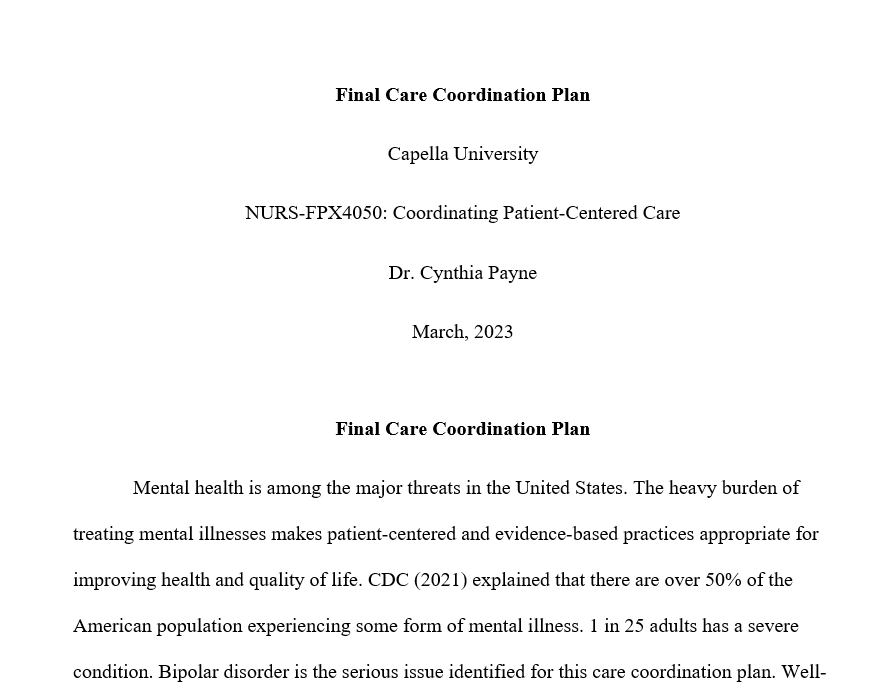Capella University
NURS-FPX4050: Coordinating Patient-Centered Care
Dr. Cynthia Payne
March, 2023
Final Care Coordination Plan
Mental health is among the major threats in the United States. The heavy burden of treating mental illnesses makes patient-centered and evidence-based practices appropriate for improving health and quality of life. CDC (2021) explained that there are over 50% of the American population experiencing some form of mental illness. 1 in 25 adults has a severe condition. Bipolar disorder is the serious issue identified for this care coordination plan. Well-coordinated and collaborative interventions are necessary for the care team, patients, and families to monitor and manage symptoms (Jain et al., 2022). Healthcare professionals such as behavioral health counselors, psychologists, and psychiatrists help patients identify health goals appropriate for addressing bipolar disorder. The aim is to identify tailored approaches that match their values and preferences and empower individuals to embrace self-care practices.
Individualized care plans include, physical exercise, medication adherence, and healthy diet. The health goals boost patients’ interactions and engagement with the healthcare system. This way, clients can access patient-centered and culturally appropriate services essential for empowering them to describe experiences and interventions needed to improve health and quality of life. Well-coordinated mental health care reduces the risk of delayed or postponed care. This way, patients benefit from timely screening, diagnosis, and treatment. Low-income patients at the biggest beneficiaries based on flexible access to primary care providers and specialists among them case managers, behavioral health counselors, social workers, physicians, and nurses.
Patient-Centered Practices for Bipolar Disorder
Patient-centered practices align with calls for healthcare providers to help patients design and implement health goals. One goal is to encourage patients to exercise by walking swimming, or jogging 45 min thrice every week. A second health goal is consistent participation in mindfulness programs such as yoga for 45 minutes, thrice every week. Thirdly, journaling for at least 40 minutes every day will help patients describe thoughts, feelings, and other symptoms. The practice enables a patient to identify barriers and improvements necessary to achieve the best outcomes. Bipolar disorder entails shifts in moods, energy and activity levels (Jain et al., 2022). The symptoms undermine individuals’ ability to fulfil daily tasks. Depression and Bipolar Support Alliance (2023) associated the condition with increased risk of suicide and disability. As such, best practices help improve treatment compliance. Patients utilize programs such as timely screening and diagnosis intended to initiate effective and efficient treatment (Michalak et al., 2019). The aim is to prevent undiagnosed or misdiagnosed bipolar disorder through enhanced access to cognitive behavioral therapies, group therapies, motivational interviews, and social skills training.
Best practices include culturally and linguistically appropriate care. The process allows individuals to share experiences and describe enablers intended to improve thoughts, emotions, and feelings. This way, the care team creates a conducive clinical environment that allows patients and families to share insights into their preferred treatment pathways. The interactions make clients active players in identifying self-care practices appropriate for encouraging individuals to take charge of their health and well-being. Michalak et al. (2019) described the need for accessible follow-ups, counseling and medications, and other interventions ideal for optimizing care outcomes. This way, individuals living with bipolar disorder can utilize different community health resources to monitor and control symptoms.
One resource is Active Minds, a network that allows patients to participate in sessions that allow them to express their thoughts, feelings, emotions, and suggestions for optimizing care outcomes. Patients may use smartphones to access information from qualified healthcare professionals including, psychologists and psychiatrists. Another resource is community health centers that have qualified healthcare professionals including, psychiatrists, psychologists, and behavioral health counsellors. Patients access interdisciplinary teams that understand determinants of health, including a fragmented healthcare system and improvements necessary to improve health and quality of life. Further, community group yoga sessions in community halls strengthen participation in mindfulness programs and counseling. Patients identify strategies for boosting emotional, psychological, and physical resilience including, utilizing social support and follow-ups.
Ethical Aspects in Managing Patients with Bipolar Disorder
Ethics is a fundamental component of patient-centered and evidence-based care. The various values and principles make nurse, physicians, and other professionals responsive to patients’ values and preferences. Priority aspects include compassion, respect, and empathy. The care team also delivers culturally and linguistically appropriate, quality-driven, and cost-effective care. Magelssen et al. (2018) reminded healthcare professionals to focus on delivering services in a non-judgmental and non-discriminatory manner. The authors also identified openness, transparency, and honesty as key to maintaining excellent interpersonal relations across the care continuum.
Compton and Shim (2020) addressed the need for cultural intelligence and regulation to allow healthcare professionals to adjust effectively in culturally diverse environments. The principles of beneficence, justice, autonomy, and non-maleficence also make healthcare professionals responsive to ethical considerations. The care team understands patients’ best interests. Psychiatrists, psychologists, and others also avoid decisions and actions that expose patients to emotional, psychological, and physical distress (Jain et al., 2022). Further, patients have a right to determine their preferred treatment pathways. In this case, the care team should explain details of the treatment process and avoid exposing sensitive information such as clinical progress reports without consent. Justice is another consideration that enhances access to equitable and fair services (Magelssen et al., 2018). The principle highlights the need for the care team to dedicate time towards reducing health disparities by providing unbiased and unprejudiced services. The team responds to patients’ needs regardless of their social, economic, or other affiliation.
The Affordable Care Act and Bipolar Disorder Management
Health policies make healthcare providers responsive to patients’ demands. The Affordable Care Act is among the legislations designed to improve the quality, safety, and cost of patient care. ACA advocates for reduced health disparities through integrated primary and specialty care. This way, healthcare providers collaborate with patients, families, and insurance providers to understand and respond adequately to determinants of health. Equitable allocation and distribution of health resources is among the priorities under the Affordable Care Act (Thomas et al., 2018). For instance, ACA’s Office of Behavioral Health Equity clarifies the need for enhanced availability and access to essential health services across the care continuum. Patients from underserved and under-resourced communities have better opportunities to access prescription drugs, screenings, behavioral assessments, and social support delivered by community health teams and qualified mental health professionals (Thomas et al., 2018). Similarly, patients benefit from comprehensive services available within their communities. Healthcare providers should encourage patients to understand eligibility and apply for programs such as Medicaid designed to improve quality, safety, and cost of patient care.
Patient and Family Engagement
Successful bipolar disorder management requires healthcare providers to initiate proactive patient and family engagement. The process enhances collaboration and communication necessary to create the right environment for clients to share experiences and identify the best practices for optimizing care outcomes. A key element of bipolar disorder management is responding to calls for a culturally and linguistically appropriate care. This way, the care team initiates conversations that match patients’ values and preferences. Clients are comfortable describing their situation including, determinants of health, barriers, and enablers of successful outcomes. Menear et al. (2022) encouraged healthcare professionals to initiate conversations in ways that are understandable by patients and families. Psychologists, psychiatrists, and others understand the clients’ educational levels, language, and other aspects that influence the quality of communication and information flow (Compton & Shim, 2020). The aim is to initiate social support, follow-ups, and other individualized sessions designed to improve health and quality of life.
Further, the care team initiates face-to-face and online educational sessions and motivational interviews designed to make patients familiar with self-management practices appropriate for monitoring and controlling symptoms. Menear et al. (2022) also remind the care team to uphold positive interpersonal relations. The efforts help create an ideal environment characterized by compassion, respect, and empathy. Home visits are necessary to strengthen patient and family engagement. The visits empower patients to share experiences. The care team also accesses real-time and accurate insights into clinical progress and interventions necessary to optimize care outcomes.
Mental health is a priority for patients, families, and communities. Conditions such as bipolar disorder trigger adverse social, health, and economic consequences that undermine the nation’s prosperity. In this case, evidence-based and patient-centered practices such as self-management are necessary to improve the quality, safe, and cost of care across the care continuum. Self-care practices are cost-effective measures that allow individuals to take charge of their health and well-being. Individuals can also utilize ACA’s provisions to access social support, behavioral health counseling, mindfulness sessions, and medications at affordable rates. Culturally and linguistically appropriate services are also essential for the care team to respond to patients’ values and preferences.
References
CDC. (2021). About mental health. U.S. Department of Health & Human Services. https://www.cdc.gov/mentalhealth/learn/index.htm
Compton, M., & Shim, R. (2020). Mental illness prevention and mental health promotion: When, who, and how. Psychiatric Services, 71(9), 981-984. https://ps.psychiatryonline.org/doi/epdf/10.1176/appi.ps.201900374
Depression and Bipolar Support Alliance. (2023). Bipolar disorder statistics. Depression and Bipolar Support Alliance. https://www.dbsalliance.org/education/bipolar-disorder/bipolar-disorder-statistics/
Jain, K., Kong, A., Gillard, P., & Harrington, A. (2022). Treatment patterns among patients with bipolar disorder in the United States: A retrospective claims database analysis. Advances in Therapy, 39, 2578-2595. https://link.springer.com/article/10.1007/s12325-022-02112-6
Magelssen, M., Gjerberg, E., Lillemoen, L., Førde, R., Pedersen, R. (2018). Ethics support in community care makes a difference for practice. Nursing Ethics, 25(2), 165-173. https://pubmed.ncbi.nlm.nih.gov/27664037/
Menear, M., Dugas, M., Houle, J., Kates, N., Knowles, S., Martin, N., & Legare, F. (2022). Strategies for engaging patients and families in collaborative mental health care. International Journal of Integrated Care, 22(2), 157. https://www.ijic.org/articles/10.5334/ijic.ICIC21323/
Michalak, E., Morton, E., Barnes, S., Hole, R., & Murray, G. (2019). Supporting self-management in bipolar disorder: Mixed-methods knowledge translation study. JMIR Mental Health, 6(4), 1-11. https://www.ncbi.nlm.nih.gov/pmc/articles/PMC6487350/
Thomas, K., Shartzer, A., Kurth, N., & Hall, J. (2018). Impact of ACA health reforms for people with mental health conditions. Psychiatric Services, 69(2), 231-234. https://ps.psychiatryonline.org/doi/epdf/10.1176/appi.ps.201700044



